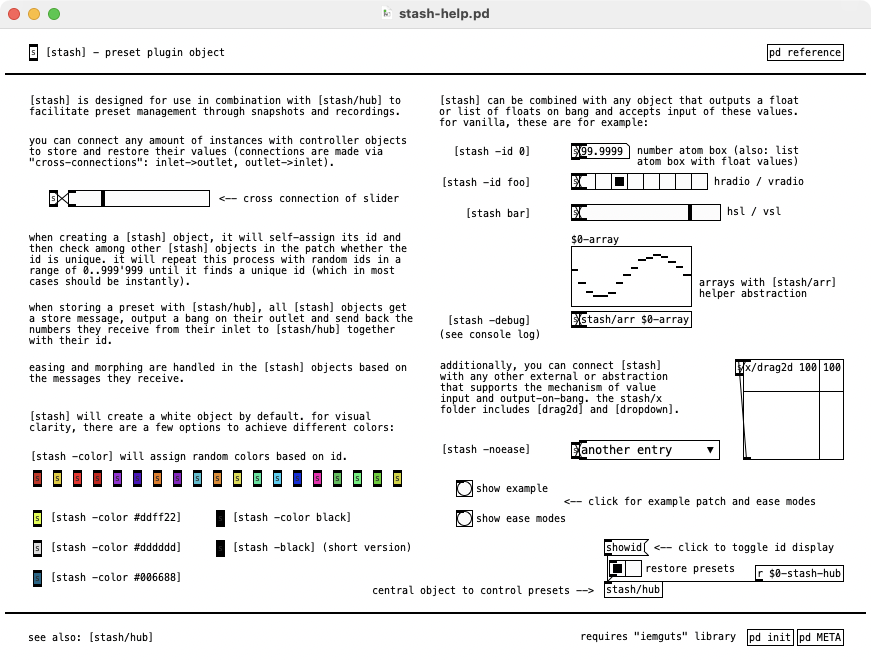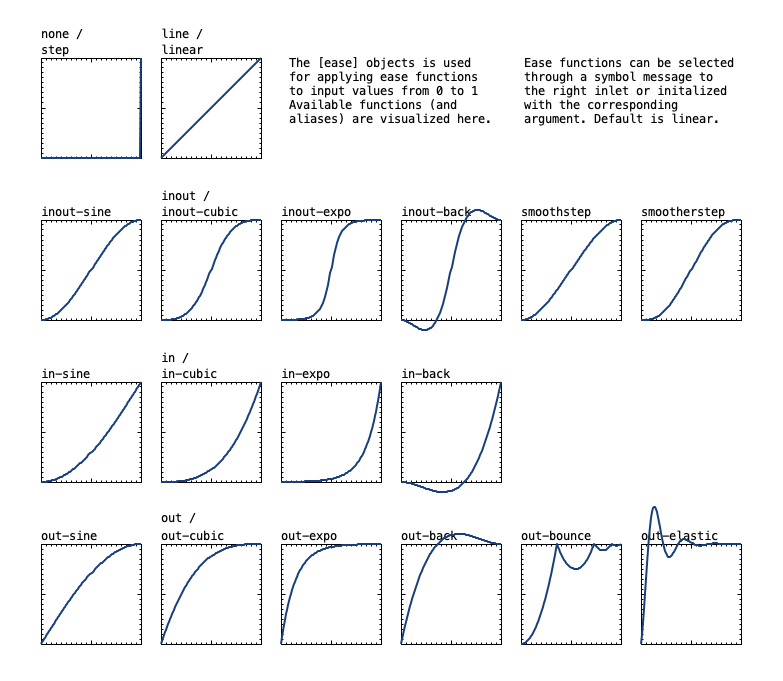Puredata (Pd) abstractions for preset management, based on central [stash/hub] and small [stash] plugin objects
- requires
iemgutslibrary (available viaDeken)
- connect [stash] objects to any number of objects to store and restore their values (connections are made via "cross-connecting" - inlet->outlet, outlet->inlet)
- create a central [stash/hub] to control presets (store, restore, record, stop, save, load, ease, morph, etc.)
- an additional [stash/arr <array_name>] object can be used to store and restore array values
- handles all objects that output their state on
banginput - save / load preset files
- store (and restore) arbitrary amount of preset states
- ease states with a variety of ease functions
- morph between states with float input (0..1 or 1..0 - depending on start value)
- record and play back value changes instead of single preset snapshots
- additional helper object [stash/arr] facilitates management of array values
- custom color and id definitions for [stash] objects
See help of [stash] object for example application.
-color (black / <hex color>)to set the color:- color will be generated based on id if no argument is given
-color blackwill create a black object (this can also be achieved by just setting the-blackflag)- you can set any hexadecimal value - e.g.
-color #ddff22
-id <id>,<float>or<symbol>to manually set id via flag or simply by adding a float or symbol argument-noeaseto avoid easing of values (and always directly jump to target value)-debugto output id on creation-p $0to manually set parent's $0 (and avoidiemgutsdependency)-nogopto display as regular object without graph-on-parent
<float>to restore preset of given id (snapshot or recording). if no preset is present, the id is selected (to store or record into)restore <id>to restore preset of given idtarget <id>to set target id formorphinteractionmorph <float> to morph to target state with float input of values0..1morph can go in both directions, dependet on whether 0 or 1 is first registered valuestore (<id>)to store values to given id (or to selected id if no argument is given)load (<filename>)to load presets from file (or via file selection through openpanel if no argument is given)save (<filename>)to save presets to file (or via file selection through savepanel if no argument is given)delete (<id>)to delete presets at given id (or selected id if no argument is given)clickoreditto display preset data in [text] dialog (should not be edited there due to Pd bug when displaying and storing data with escaped\,and\;)clearto clear all presetsrecord (<id>)to start recording to given id (or to selected id if no argument is given)stopto stop recording (or playback)showid (<0/1>)to display [stash] ids next to objectsgrain <float>to set grain size for easing in ms (default is 20, since this is based on Pd's [line])easetime <float>to set ease duration in mseasemode <mode>to set ease mode (see functions below)
-p $0to manually set parent's $0 (and avoidiemgutsdependency)
see [ease] abstraction help patch x/ease-help.pd
- when creating a [stash] object, it will self-assign its id and then check among other [stash] objects in the patch whether the id is unique. it will repeat this process with random ids in a range of
0..999'999until it finds a unique id (which in most cases should be instantly) - when storing a preset with [stash/hub], all [stash] objects get a
storemessage, output a bang on their outlet and send back the numbers they receive from their inlet to [stash/hub] together with their id - easing and morphing are handled in the [stash] objects based on the messages they receive

